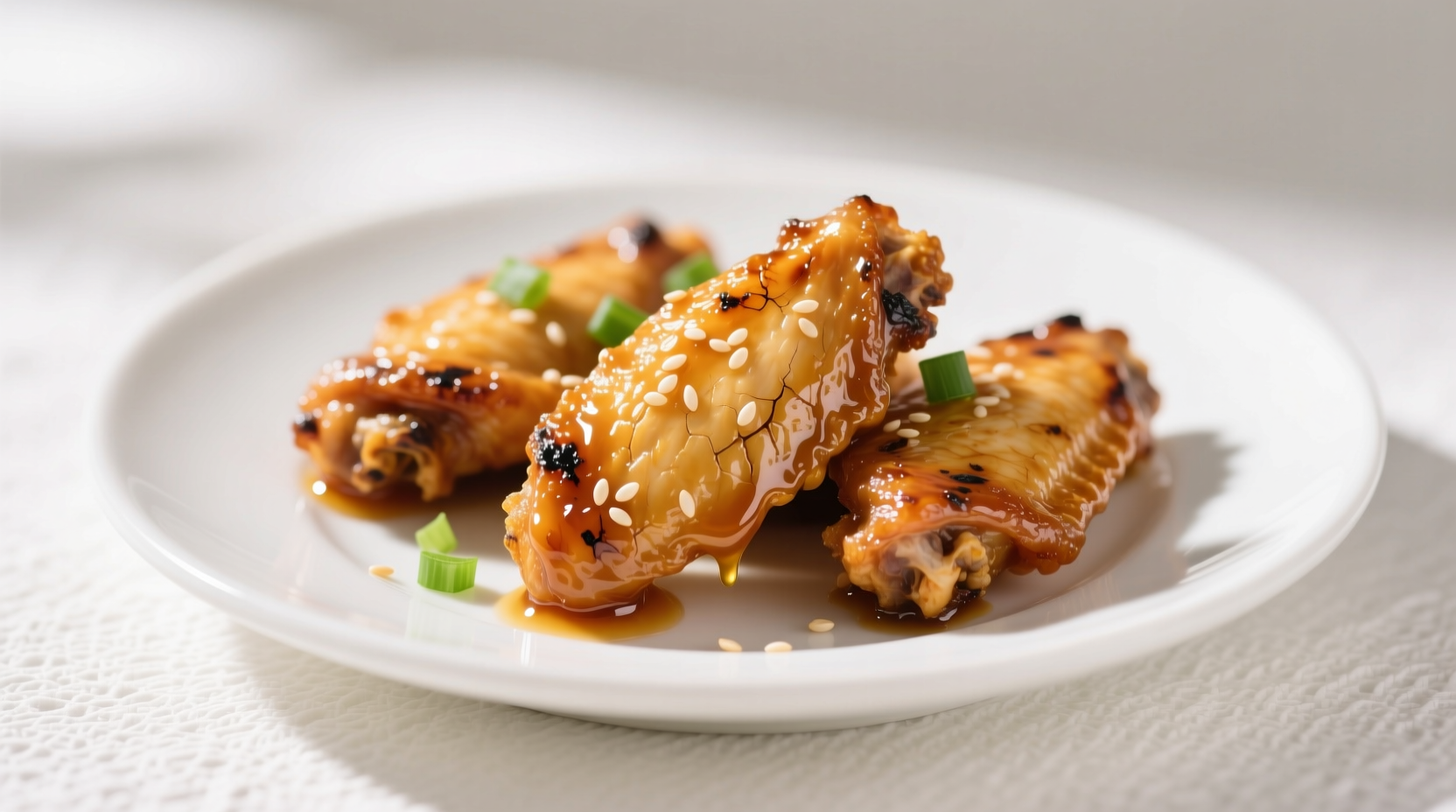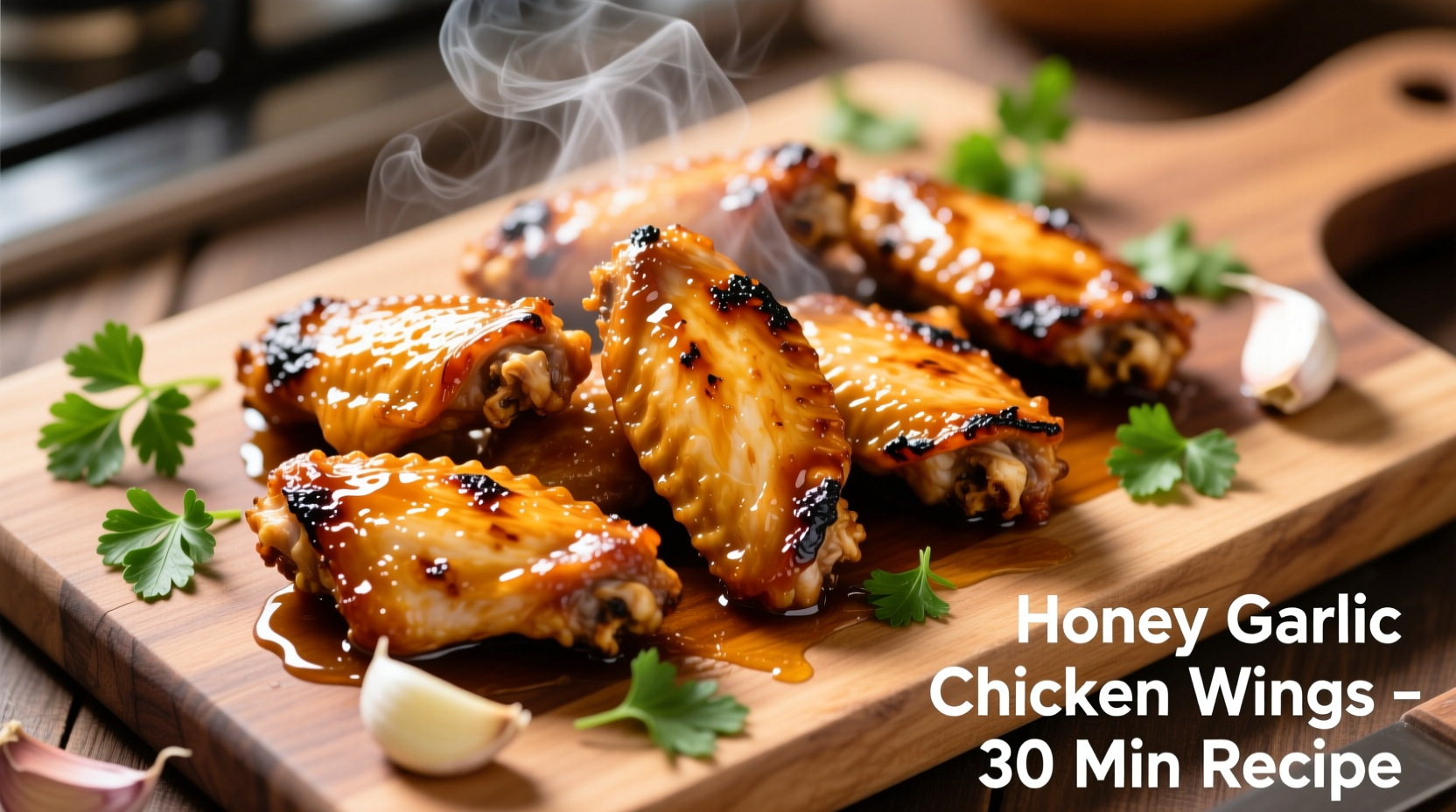Perfect honey garlic chicken wings require 20 minutes of prep, 45 minutes of cooking time, and reach a safe internal temperature of 165°F (74°C). This authentic recipe delivers crispy skin with a balanced sweet-spicy glaze using simple pantry ingredients. You'll get restaurant-quality results without deep frying, plus professional tips for maximizing flavor and texture.
Nothing beats the irresistible combination of sweet honey and pungent garlic coating crispy chicken wings. This foolproof recipe transforms basic ingredients into an extraordinary appetizer that consistently wins over crowds. Whether you're preparing game day snacks or an impressive dinner party starter, these wings deliver perfect crispness and complex flavor in under an hour.
Why This Honey Garlic Chicken Wings Recipe Works
Professional chefs achieve perfect wings through precise temperature control and strategic ingredient layering. The secret lies in the dual-cooking method: baking first for crispness, then tossing in sauce at the end to maintain texture. Unlike deep-fried versions, this approach creates healthier wings without sacrificing crunch.
According to USDA food safety guidelines, poultry must reach 165°F internal temperature to eliminate harmful bacteria. Using an instant-read thermometer ensures your wings reach this critical threshold while maintaining juiciness. Proper temperature control separates successful wings from dry, unsafe results.
Essential Ingredients and Equipment
Quality ingredients make the difference between ordinary and extraordinary wings. Here's what you'll need:
| Ingredient | Quantity | Key Purpose |
|---|---|---|
| Chicken wings (whole) | 2 lbs (900g) | Base protein with ideal fat-to-meat ratio |
| Baking powder (aluminum-free) | 1 tsp | Crisps skin without altering flavor |
| Fresh garlic, minced | 6 cloves | Provides authentic pungent flavor |
| Raw honey | 1/2 cup | Natural sweetness with complex flavor notes |
| Rice vinegar | 2 tbsp | Balances sweetness and enhances garlic flavor |
| Soy sauce (low sodium) | 3 tbsp | Provides umami depth without overpowering |
Equipment essentials: wire rack, rimmed baking sheet, instant-read thermometer, medium saucepan, and mixing bowls. The wire rack setup allows hot air circulation for even crisping - a technique professional kitchens use for perfect wing texture.
Step-by-Step Preparation Guide
Wing Preparation (15 minutes)
Start by separating whole wings into flats and drumettes. Pat each piece completely dry with paper towels - moisture is the enemy of crisp skin. In a large bowl, combine wings with 1 teaspoon baking powder, 1 teaspoon cornstarch, 1/2 teaspoon salt, and 1/4 teaspoon black pepper. The baking powder raises the skin's pH level, accelerating the Maillard reaction for superior browning.
Baking Process (45 minutes)
Arrange wings in a single layer on a wire rack set over a rimmed baking sheet. Refrigerate uncovered for 1 hour (optional but recommended for extra-crispy results). Bake at 400°F (200°C) for 40-45 minutes, flipping halfway, until golden brown and reaching 165°F internally. This dry-heat method renders fat slowly for maximum crispness without splattering oil.
Sauce Creation (10 minutes)
While wings bake, prepare the sauce. Sauté minced garlic in 1 tablespoon oil over medium-low heat until fragrant (about 1 minute). Add honey, soy sauce, rice vinegar, 1/4 teaspoon red pepper flakes, and 2 tablespoons water. Simmer 5-7 minutes until slightly thickened. The vinegar's acidity cuts through richness while enhancing garlic's aromatic compounds.
Finishing Touches
Toss hot wings in sauce immediately before serving. Over-saucing creates soggy wings - aim for light, even coating. Garnish with sliced green onions and sesame seeds. For extra flavor dimension, add 1 teaspoon fresh ginger to the sauce during simmering.

Proven Cooking Techniques for Perfect Results
Avoid these common mistakes that ruin honey garlic wings:
- Adding sauce too early: Toss wings in sauce only after baking for maximum crispness
- Using pre-made garlic paste: Fresh garlic provides superior flavor complexity
- Skipping the drying step: Moisture prevents proper crisping
- Overcrowding the pan: Space wings properly for even air circulation
The honey garlic sauce tradition evolved from Chinese-Canadian restaurants in the 1970s, blending Cantonese cooking techniques with Western ingredients. Authentic versions balance five fundamental flavors: sweet (honey), salty (soy sauce), sour (vinegar), bitter (garlic), and umami (chicken fat). This harmony creates the addictive quality that makes these wings irresistible.
Variations for Different Dietary Needs
Gluten-Free Adaptation
Substitute tamari for soy sauce and verify your baking powder is gluten-free. Most commercial baking powders contain cornstarch rather than wheat, but checking prevents cross-contamination.
Air Fryer Method
For faster cooking, air fry wings at 380°F (193°C) for 22-25 minutes, shaking basket halfway. The concentrated heat creates exceptional crispness in less time. This method works particularly well for smaller batches.
Spice Level Adjustments
Control heat precisely by adjusting red pepper flakes:
- Mild: Omit completely
- Medium: 1/4 teaspoon
- Hot: 1/2 teaspoon plus 1 minced fresh chili
Serving Suggestions and Storage Tips
Serve immediately with cooling sides like cucumber salad or celery sticks. The wings pair perfectly with light lagers or crisp white wines that cut through richness. Leftovers keep refrigerated for 3 days - reheat in oven at 350°F (175°C) for 10 minutes to restore crispness. Never microwave, as this creates rubbery texture.
For meal prep, store sauce separately from wings. Toss only the portions you'll eat immediately to maintain optimal texture throughout the week. This professional technique preserves quality better than pre-sauced storage.











 浙公网安备
33010002000092号
浙公网安备
33010002000092号 浙B2-20120091-4
浙B2-20120091-4